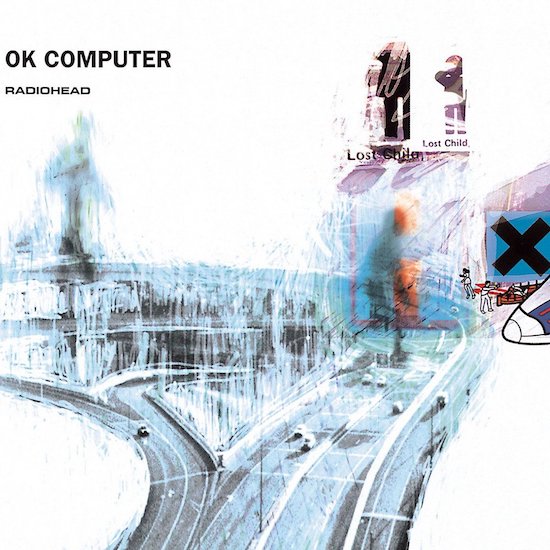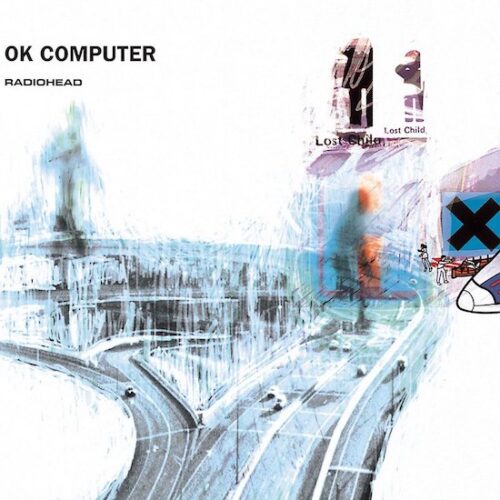In his October 2000 review of Radiohead’s monumentally-anticipated Kid A, Douglas Wolk of the Village Voice called its critically-devoured predecessor OK Computer "an ‘about’ file for a 20-gigabyte suicide note”. With 20-gigabyte serving as the operative term here, Wolk nailed it: rather than simply fare as a feature-length plea from twenty-seven-year-old Thom Yorke, Radiohead had lit a flare that traced the emptiness of dial-up solipsism and the dawn of a new era of psychic and technological anxiety. Viewed from the vantage point of the very same future it foretold, OK Computer remains a bona fide Year Zero creative statement, and one that warned against updating the old operating system before properly checking out the small print.
Released amidst a surge of revisionist rock and flash-in-the-pan hit worship, the ricochet of The Bends was always going to make a big din. But whilst Oasis were found lapping at the teat of banality by encouraging the hoi polloi to Be Here Now, Radiohead fancied they could turn the notion of exploiting such a maxim on its head by probing whether meaningful human connection on the cusp of the millennium was still on the agenda.
In the two short years since the likes of ‘Street Spirit’ and ‘My Iron Lung’ confirmed their arrival as alternative heroes with something to say, many of us were beginning to buzz with anticipation at their return. As such, via a curious cast of dazed and disconnected extra-terrestrial characters, OK Computer probed both our desire and ability to shirk the growing sense of alienation that accompanied the rapid shifts of the time with all the unknowable sway of a Hotmail Chatroom mod.
Excluding the death of Princess Diana, a handful of under-reported civil conflicts and the first coming of Hanson, you would be hard pushed to find much menace etched in the collective memory of 1997. With untold worldly shit yet to hit the fan, Radiohead instead confronted the nebulous sense of pre-millennial disquiet that hung in the air with uncanny tact.
Where 2003’s Hail To The Thief remains their most overt political statement and Kid A/Amnesiac proved a joint exhibition in subverting expectation with remarkable results, OK Computer sparred with blind consumerism, artificiality, doom, decay and what cultural critic Neil Postman coined "technopoly" (or “the surrender of culture to technology”) with a grasp of the murkier processes that powered the changes that also made it an exciting time to be alive.
Forged just as Steve Jobs returned to Apple, and DVD and videoconferencing were being peddled as the next big things in tech, it was a record that, even in its titling, proved an explicit acknowledgement of the breakneck ascent of hypermodernity. Where ‘Climbing Up The Walls’ and ‘Paranoid Android’, with its weaving tale of networking yuppies and inconsequential opinion, fared as the album’s two most explicit accounts of isolation and insanity – the latter doubling up as a kind of Douglas Adams-inspired ‘Bohemian Rhapsody’ for the Geocities generation – ‘Fitter Happier’ best distilled the primary fixation of OK Computer. Later deemed by Yorke as the “most upsetting thing” he ever wrought, the track’s robotic narrative (featuring Macintosh PlainTalk legend Fred, chosen for “his” classic emotional neutrality) feels today like a long-lost first blog post from the late-90s fed through voice automation or Tony Robbins re-programming Siri whilst slowly descending into a particularly manic episode. In an age when productivity apps and Fitbits are, at best, grossly askew barometers of self-worth – where unrealistic expectations are shaped by the immaculate cyber constructs of estranged school friends – Fred bounds forth from the recent past, reminding us that if we choose to define our hopes and dreams via wires and screens we’re going to be grossly disappointed.
Rather than a furiously flown white flag, however, OK Computer still feels much more like an impressionistic commentary on the cul-de-sacs that we were slowing backing ourselves into rather than a consciously-crafted thesis. Bearing in mind the band vetoed its status as a concept album, Radiohead allowed OK Computer to follow its own course largely without the interference of pointed self-mythology. Realised in the last gasping days of Conservative rule and the first wave of Spice Girls fever, it was unveiled when corporate-controlled New Labour – lest we ever forget – lionised the odd belief that “things could only get better”. Framed by this no-mans-land of self-congratulatory false progress, ‘No Surprises’, for example, felt like a mini-soundtrack to the widescreen realisation that settling for the slightly better option wasn’t exactly a million miles from outright political apathy. From his knowingly listless “bring down the government, they don’t speak for us” to his sneering, frisson-inducing refrain, Thom Yorke’s personification of the everyday dupe of corrosive normality was, upon slightly closer inspection, a resounding slammed fist on the table. And how that resonates tenfold today.
But for all its cautious prescience, OK Computer is an album that embraced the spiritual currency and symbolic potency of dichotomy, recognising that the line between alienation and salvation is, both in theory and actuality, often precariously thin. With its backdrop of travel, dislocation and staggered progress – from the redemptive, second-chance ecstasy of opener ‘Airbag’ to the necessity of slowing down on its exquisite flame-out ‘The Tourist’ (“Sometimes I get overcharged/That’s when you see sparks”) – the listener is also invited to heed the moments of rapture and reprieve. Radiohead made the apparent slumping of modern civilisation something to tolerate – celebrate even. On the one hand, the likes of ‘Subterranean Homesick Alien’ and ‘Exit Music (For A Film)’ laid bare all-consuming spiritual alienation and the imminent need to escape the modern world respectively. On the other, ‘Lucky’ and ‘Let Down’ burst forth as existential overtures to defiance and freedom despite overwhelming odds to the contrary. Back-to-back, one sees that the “Computer” in question here isn’t the issue – it’s how readily we tell it “OK”.
Where Yorke derided self-sabotage on The Bends peak ‘Just’, ‘Karma Police’ – with its far-sighted account of conformity and state surveillance – drew something of a complementary conclusion: if you are not too careful (that is, if you fail to care enough) this is what you’ll get. But rather than force a mirror up to the face of the listener, beset by bloated told-you-so histrionics, Radiohead legitimised real-world concerns and private fears in a way that felt simultaneously cautionary and reassuring; human and other; defiant and vulnerable. In other words, entirely relatable. In harnessing the sense of cognitive dissonance that stemmed from the tug-o-war between technological advancement and patent social downturn; the luxury of recording in an ultra-modern studio and repulsion of its wider ramifications; what Yorke would later call “fame-madness” and the growing desire to disappear completely, Radiohead spearheaded a singular narrative from both their own story and the broader conflicts that fuelled the Zeitgeist. If, as per Douglas Wolk’s reasoning, it doubled up as a “20-gigabyte suicide note”, OK Computer was ghost written by us all.
In foreseeing our deferent relationship with technology and the spiritual bankruptcy of slowly recognising that Big Brother is also mother, father and the entire extended family combined, OK Computer registered the largely unfelt tremors of what has become a much bigger rupture in the fault line twenty years later. Framed by cellular zombification (‘Fitter Happier’), the madness of the Trump era (“Hitler hairdo…” indeed), the shitshow that is Brexit and the forthcoming general election (‘No Surprises’, ‘Electioneering’), not to mention that sense of impending doom that tends accompany everyday life in 2017, Radiohead’s third album is a release that continues to hit home with extraordinary weight and prescience today.
As for the next two decades? No surprises, please.



